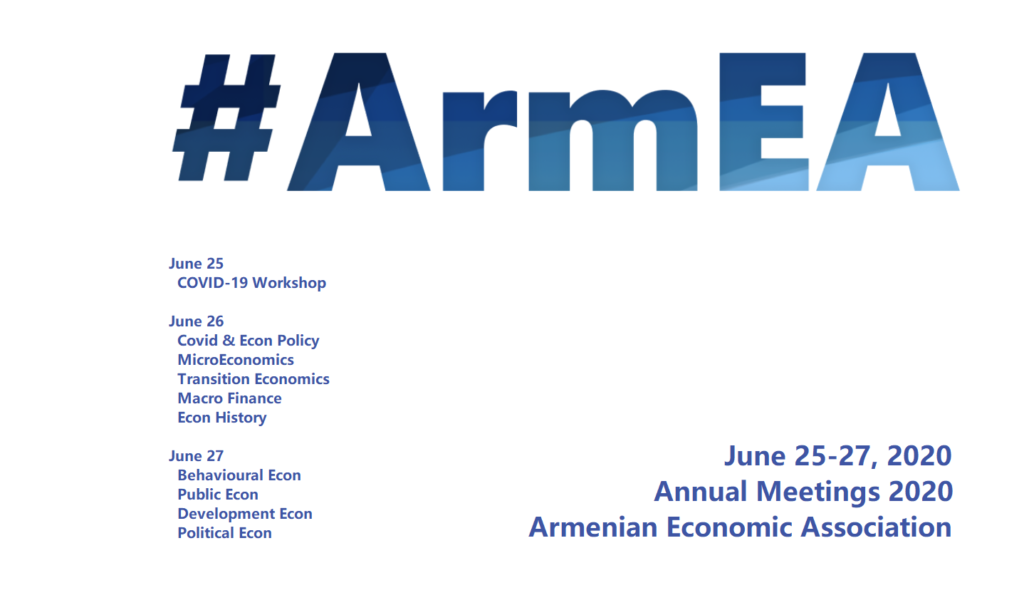All Yerevan time: (Moscow -1, Paris -2, London -3, New York -8, Los Angeles -11)
Thursday, June 25, 2020
17:45 Welcome
18:00 – 19:30 Session 1: Covid and Economic Policy I
Chair: Vahagn Jerbashian, University of Barcelona
An economic model of the Covid-19 epidemic: The importance of testing and age-specific policies
Phillip Kircher, European University Institute (joint with Luiz Brotherhood, Cezar Santos and Michèle Tertilt)
Firm Behavior during an Epidemic
Luiz Brotherhood, Universitat de Barcelona (with Vahagn Jerbashian, University of Barcelona)
The Impact of Coronavirus on Formal Firms: an Application using Tax Data across Countries
Pierre Bachas, World Bank (with Anne Brockmeyer and Camille Semelet)
19:40 – 20:10 Covid in Armenia
A short presentation of results from a survey of Armenian economists and professionals about the impact of
COVID-19 and potential policies
Zareh Asatryan (ZEW Mannheim), Vladimir Asriyan (CREi), Vahagn Jerbashian (UB)
20:15 – 21:45 Session 2: Covid and Economic Policy II
Chair: Vladimir Asriyan, CREi
Labor Markets during Pandemics, Marek Kapicka, CERGE-EI (joint with Peter Rupert)
Covid-19 Coronavirus and Macroeconomic Policy, Luca Fornaro, CREi (joint with Martin Wolf)
A Model of Asset Price Spirals and Aggregate Demand Amplification of a “Covid-19” Shock, Alp Simsek, MIT
(joint with Ricardo Caballero)
Friday, June 26, 2020
9:30-10:00 Martin Galstyan, Chairman of Central Bank of Armenia: Remarks on COVID-19 and its economic implications
COVID-19 and its Economic Implications
10:10-11:45 Session 3: Covid and Economic Policy III
Chair: Nerses Yeritsyan, Central Bank of Armenia
Gender Inequality and Access to Healthcare in the Time of Pandemic
Yeva Aleksanyan, Colorado State University
Optimal Policy during COVID-19
Vahagn Davtyan, Central Bank of Armenia
Estimation of the final size and its peak time of the COVID-19 epidemic
Karen Poghosyan, Central Bank of Armenia (with Ruben Poghosyan, Yerevan State University)
Modeling the Effects of Health Shock on Economy: Standard NK DSGE Framework, Ani Asoyan, Central Bank of Armenia (with Vahagn Davtyan, Haykaz Igityan, Hasmik Kartashyan, Hovhannes Manukyan)
12:00-13:30 Session 4: Micro
Chair: Nune Hovhannisyan, Loyola University Maryland
Screening Teams of Moral and Altruistic Agents Roberto Sarkisian, Toulouse School of Economics
Setting-aside in procurement: the effect of winning a contract on firm growth
Gegam Shagbazian, University of Padova
Learning by Exporting: Evidence of Learning from American Manufacturing Industries Nune Hovhannisyan, Loyola University Marylan (with Fabio Mendez)
13:45-15:30 Session 5: Transition / Development Policy
Chair: Aleksandr V. Gevorkyan, St. John’s University NY
International Development and the Washington Consensus: A Pluralist Perspective
John Marangos, University of Macedonia, Greece
Spillover Effects of the US and the Western Economic Sanctions against Russia on other Transition Economies
Gohar Sedrakyan, Agnes Scott College & Georgia State University, USA
FX-related Macroprudential Measures and Financial Dollarization in Armenia
Hayk Avetisyan, Columbia University
Should Armenia stand out globally with a comprehensive mineral development policy?
Terence Ortslan TSO & Associates
Bond markets and macroeconomic vulnerabilities in select post-socialist economies
Aleksandr V. Gevorkyan, St. John’s University NY
15:45-17:15 Session 6: Finance and Macro
Chair: Armen Nurbekyan, CBA
Collateral Booms and Information Depletion Vladimir Asriyan, CREI, UPF, Barcelona GSE and CEPR (with Luc Laeven and Alberto Martin)
Interest Rate Risk Insurance vs. Current Cost Minimization in Mortgage Borrowing: Evidence from Mortgage Applications and Banks’ Responses
Vardges Levonyan, University of Zurich (with Christoph Basten and Benjamin Guin)
Partial Ambiguity and Fuzzy Decision-making in Asset Markets
Aram Balagyozyan, The University of Scranton, with Christos Giannikos, The Graduate Center and Zicklin
School of Business, Baruch College, The City University of New York
Corporate Deleveraging: The Impact of Debt Maturity Structure and Callable Debt, Armen Hovakimian, Baruch
College, City University of New York, with Xiaoyu Zhu, Baruch College
17:45-19:15 Economic History
Chair: David Gomtsyan, HSE
State Presence and Local Economic Development: the Russian State in the Urals, Raphael Franck
Hebrew University of Jerusalem, with Gerda Asmus
The Fetters of Inheritance? Equal Partition and Regional Economic Development, Fabian Wahl, University of
Hohenheim, with Thilo R. Huning
History’s Masters: The Effect of National Leaders on State Performance
Nico Voigtländer, UCLA (with Sebastian Ottinger)
Saturday, June 27, 2020
11:00-12:15 Session 8: Behavioral Economics
Chair: Armenak Antinyan (Zhongnan University)
Economic Preferences and Compliance in the Social Stress Test of the Corona Crisis
Holger Rau, University of Göttingen (with Stephan Mueller)
Ordinal Rank and Peer Composition: Two Sides of the Same Coin?
Marco Bertoni, University of Padova (with Roberto Nisticò)
Trust in the Healthcare System and COVID-19 Treatment in the Developing World. Survey and Experimental
Evidence from Armenia
Luca Corazzini, University of Venice (with Armenak Antinyan, Thomas Bassetti, and Filippo Pavesi)
12:45-14:00 Session 9: Public Economics
Chair: Gohar Sedrakyan, Agnes Scott College & Georgia State University
The Cost of Remoteness: Access to Public Health Services and the Impact on Mortality in Rural Italy
Rebecca Maria Mari, London School of Economics and Political Science
The impact of urbanization on CO2 emissions in Russia
Natalia Davidson, Ural Federal University
Comparative Studies of Cross-border M&A and Greenfield Investments in Response to Changes in Tax
Regulation and Administration of Host Economies
Gohar Sedrakyan, Agnes Scott College & Georgia State University
14:30-16:15 Session 10: Demographics and Social Policy
Chair: Yeva Aleksanyan, Colorado State University, USA
The impact of social security coordination treaties on migration in Armenia
Sandra Brožová , University of Economics in Prague, Czech Republic
Can medical school policy be a voice of reason for unfortunate marriage between big pharma and physicians?
Yeva Aleksanyan, Colorado State University, USA
16:45-18:00 Session 11: Political Economics
Chair: Tatevik Sekhposyan, Texas A&M University
Populism and Polarization in Social Media Without Fake News: The Vicious Circle of Biases, Beliefs and
Network Homophily
Zaruhi Hakobyan, University of Luxembourg & Higher School of Economics
Cycles of Vicious Conflict and Virtuous Cooperation and their Interplay
Muhammad Asali, ISET-International School of Economics, Georgia
Down to the Last Strike: The Effect of the Jury Lottery on Criminal Convictions
Scott Kostyshak, University of Florida (with Neel Sukhatme)
18:00 Awards and Adjourn
